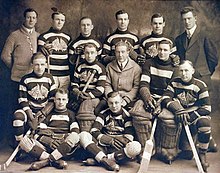Kind Ross
| Hockey Hall of Fame , 1949 | |
|---|---|
| Date of birth | January 13, 1886 |
| place of birth | Naughton , Ontario , Canada |
| date of death | 5th August 1964 |
| Place of death | Medford , Massachusetts , USA |
| position | defender |
| Career stations | |
| 1902-1904 | Montreal Westmount |
| 1904-1905 | Montreal Merchants |
| 1905-1907 | Brandon Elks |
| 1907-1909 | Montreal Wanderers |
| 1909-1910 | Haileybury Comets |
| 1910-1914 | Montreal Wanderers |
| 1914-1916 | Ottawa Senators |
| 1916-1918 | Montreal Wanderers |
Arthur Howie "Art" Ross (born January 13, 1886 in Naughton , Ontario , † August 5, 1964 in Medford , Massachusetts , United States ) was a Canadian ice hockey player and coach . In the National Hockey League he played three games for the Montreal Wanderers and was the first head coach and general manager of the Boston Bruins .
Career
Ross grew up in Montreal and learned to play ice hockey there. He played for various teams in Montreal, Brandun and Kenora. From 1907 he played mostly for the Montreal Wanderers , with side trips to the Cobalt Silver Kings (TPHL), Haileybury Comets (NHA) and the Ottawa Senators (NHA). As a player, he won the Stanley Cup twice , in 1907 with the Kenora Thistles and in 1908 with the Montreal Wanderers . Even when the NHL was founded in 1917, he was still in Montreal, but after a stadium fire, the Wanderers season and his career as a player came to an end.
He later tried his hand at refereeing and even directed a final game for the Stanley Cup . After this game he met Charles Adams, who later became the first owner of the Boston Bruins . The two got on well, and Adams was impressed with both the views and knowledge of ice hockey the Ross had. When the Bruins joined the NHL as the first American team in 1924, Adams brought him as coach and general manager. In his 30 years as general manager until 1954, he had hired another coach three times by 1945, but no later than two years later he was back behind the gang himself. He always took the view that he did not have to teach the players how to play ice hockey and limited his actions largely to the tactical attitude of the team. He also knew how to hire his players and knew how to take each of them. He also knew how to best use his players. So he put the former attacker Dit Clapper in the defense, which extended his career by a few years. He made the young defender Woody Dumart a winger in the later legendary Kraut Line . In the first playoff round of the 1938/39 season he brought in his first line of attack to top scorer Bill Cowley , the little Mel Hill , who had been sorted out by the opponent, the New York Rangers . Sudden Death Hill decided the final series with three goals in overtime.
In the team, Milt Schmidt was one of his pupils, while he fought numerous private feuds with Eddie Shore . However, his greatest opponent in the league was Toronto's general manager Conn Smythe . While the two had fought many small wars with each other at a young age, they only reconciled towards the end of the Second World War .
After a game against the New York Americans in 1931, the superior Bruins were tired of the fact that the opponent only freed himself with long shots. The attempt to convince the NHL to introduce an "icing" rule failed. In order to emphasize the demand, the Art Ross team managed to score 87 long-range shots in the second leg against the Americans. The game ended 0-0.
But his services to modern ice hockey go far beyond the activities in his clubs. Art Ross pushed through the use of plastic pucks and invented goals that look like a "B" from above and have a net hanging in them to prevent the puck from jumping out of the goal again. Ross was also the first coach to replace a goalkeeper with a sixth outfield player.
Art Ross was inducted into the Hockey Hall of Fame in 1949 when it opened .
The NHL honored him in 1947 with the introduction of the Art Ross Trophy , the trophy for the top scorer of the regular season.
Awards
- 1939: First All-Star Team / Trainer
- 1938 and 1941: Second All-Star Team / Trainer
- 1949: Induction into the Hockey Hall of Fame
- 1984: Lester Patrick Trophy
Web links
- Art Ross in the database of the Hockey Hall of Fame (English)
- Art Ross at hockeydb.com (English)
Individual evidence
- ^ Saskatoon Star-Phoenix: Ross One of Two New Men Elected to Hall of Fame. In: news.google.com. October 22, 1949. Retrieved July 13, 2018 .
- ^ Ottawa Citizen: Two Members Added to Hall of Fame. In: news.google.com. October 20, 1949. Retrieved July 13, 2018 .
| personal data | |
|---|---|
| SURNAME | Ross, Art |
| ALTERNATIVE NAMES | Ross, Arthur Howie (full name) |
| BRIEF DESCRIPTION | Canadian ice hockey coach |
| DATE OF BIRTH | January 13, 1886 |
| PLACE OF BIRTH | Naughton, Ontario |
| DATE OF DEATH | 5th August 1964 |
| Place of death | Medford , Massachusetts |


